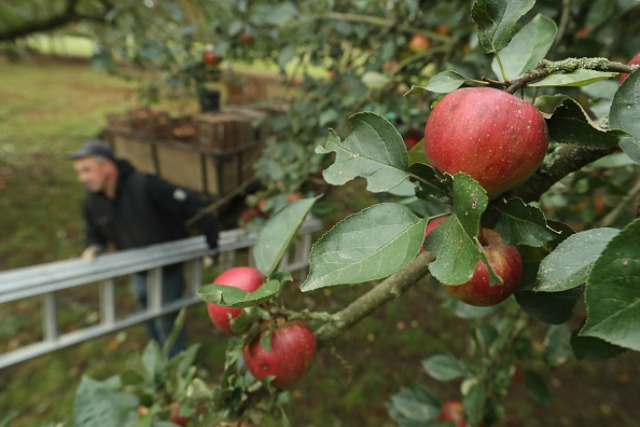The Downside To This Record Warmth? Apples At Risk, More Mosquitoes
By Stephen Gossett in News on Feb 21, 2017 6:55PM

Photo: Sean Gallup
Updated 2:00 p.m. While Chicagoans continue to enjoy record February warmth, Illinois climate researchers expressed anxiety about how so much unseasonably high temperatures could impact some plant life and important agriculture, especially certain fruit crops, and result in more pests.
The primary, immediate concern revolves around plant life that has broken dormancy and bloomed early than usual. If a winter-appropriate cold snap were to eventually return before the arrival of the actual spring season, it could lead to a host of damage to those early-appearing buds, according to Jim Angel, Illinois State Climatologist.
"When the cold weather does return we can see a variety frost damage. Some of that is Cosmetic but—when you look at trees that flower for fruit—that could damage buds and lead to diminished fruit production," Angel told Chicagoist. "That's the big worry now," he added, noting that daylilies have already popped up in his yard. (Reminder: It's February.)
That could spell trouble for some Illinois agriculture. Apple orchards are at particularly high risk, Angel said, while the peach crop more common to southern Illinois plus winter wheat and alfalfa face uncertainty, too. "Growers are nervous about this weather, and there's not much we can do," he said.
Pests tend to increase in following warm winters, also, according to David Kristovich, Head of Climate and Atmospheric Science Section, Illinois State Water Survey. Mosquitoes and other insects, along with burrowing yard pests that are usually diminished by a normal winter could very well be in higher numbers in the spring, Kristovich said.
This potential cycle—untimely warmth followed by plant-damaging frosts—has hit Illinois before, most recently in 2012 an 2007. Nationwide in 2007, that perfect-storm combination resulted in an estimated $1 billion in lost agricultural and horticultural crops, according to the US Department of Commerce.
Angel notes that, while the forecast for the next week or so calls for more warm weather, "beyond two weeks, those colder temperatures might return."
The best case scenario? A return to cooler, normal-for-February temperatures, but without a bitterly cold snap—a turn of events that Angel sadly calls "a long shot."
"It's not unusual even in late March to get a real, hard freeze, where the temperature doesn't even go above freezing during the day," according to Doug Taron, Chief Curator of the Chicago Academy of Science. "There's lots of uncertainty over what will happen over the next month."
With the recent warm front, Taron has received reports of frogs and butterflies spotted out in the region much earlier than usual. But at least, he said, if the cold returns those animals can "hunker back down."
In the meantime, we suggest enjoying an apple or two—and enjoying not being covered in mosquito bites.